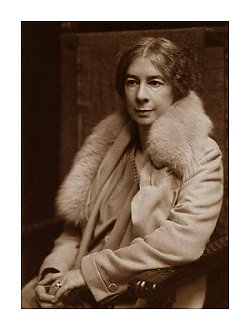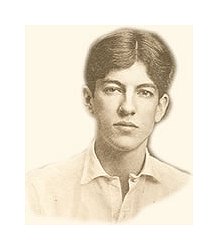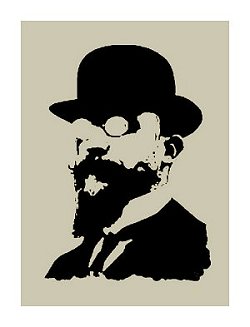Fleurs du Mal Magazine


Or see the index
Guy de Maupassant
(1850-1893)
SOUVENIRS
Voyez partir l’hirondelle,
Elle fuit à tire d’aile,
Mais revient toujours fidèle,
A son nid,
Sitôt que des hivers le grand froid est fini.
L’homme, au gré de son envie,
Errant promène sa vie
Par le souvenir suivie
De ces lieux
Où sourit son enfance, où dorment ses aïeux.
Et puis, quand il sent que l’âge
A glacé son grand courage,
Il les regrette et, plus sage,
Vient chercher
Un tranquille bonheur près de son vieux clocher.
Rouen, 1869
Souvenirs a paru dans les Annales politiques et littéraires du 12 décembre 1897
Guy de Maupassant poetry
fleursdumal.nl magazine
More in: Archive M-N, Guy de Maupassant, Maupassant, Guy de

AIM Awards 2014:
Poet Kate Tempest
for Independent Album
One of the nominations for this year’s AIM Awards is the wonderful Kate Tempest, who recently released her debut solo album Everybody Down on Big Dada. The album was produced by Dan Carey, and is in the running for Independent Album Of The Year.
The full list of nominees
INDEPENDENT ALBUM OF THE YEAR
Actress – Ghettoville
Arctic Monkeys – AMMixRadio
East India Youth – Total Strife Forever
Fred V & Graffix – Recognise
Gruff Rhys – American Interior
Kate Tempest – Everybody Down
London Grammar – If You Wait
Mogwai – Rave Tapes
Tune-Yards – Nikki Nack
Within Temptation – Hydra
The fourth annual AIM Independent Music Awards
takes place at London’s The Brewery
on 2nd September 2014.
# More on Everybody Down from Kate Tempest
fleursdumal.nl magazine
More in: Archive S-T, Art & Literature News, Kate/Kae Tempest, MUSIC, Tempest, Kate/Kae

The Sorrows of Young Werther (52) by J.W. von Goethe
NOVEMBER 26.
Oftentimes I say to myself, “Thou alone art wretched: all other mortals
are happy, none are distressed like thee!” Then I read a passage in an
ancient poet, and I seem to understand my own heart. I have so much to
endure! Have men before me ever been so wretched?
NOVEMBER 30.
I shall never be myself again! Wherever I go, some fatality occurs to
distract me. Even to-day alas–for our destiny! alas for human nature!
About dinner-time I went to walk by the river-side, for I had no
appetite. Everything around seemed gloomy: a cold and damp easterly wind
blew from the mountains, and black, heavy clouds spread over the plain.
I observed at a distance a man in a tattered coat: he was wandering
among the rocks, and seemed to be looking for plants. When I approached,
he turned round at the noise; and I saw that he had an interesting
countenance in which a settled melancholy, strongly marked by
benevolence, formed the principal feature. His long black hair was
divided, and flowed over his shoulders. As his garb betokened a person
of the lower order, I thought he would not take it ill if I inquired
about his business; and I therefore asked what he was seeking. He
replied, with a deep sigh, that he was looking for flowers, and could
find none. “But it is not the season,” I observed, with a smile. “Oh,
there are so many flowers!” he answered, as he came nearer to me. “In my
garden there are roses and honeysuckles of two sorts: one sort was
given to me by my father! they grow as plentifully as weeds; I have been
looking for them these two days, and cannot find them. There are flowers
out there, yellow, blue, and red; and that centaury has a very pretty
blossom: but I can find none of them.” I observed his peculiarity, and
therefore asked him, with an air of indifference, what he intended to
do with his flowers. A strange smile overspread his countenance. Holding
his finger to his mouth, he expressed a hope that I would not betray
him; and he then informed me that he had promised to gather a nosegay
for his mistress. “That is right,” said I. “Oh!” he replied, “she
possesses many other things as well: she is very rich.” “And yet,” I
continued, “she likes your nosegays.” “Oh, she has jewels and crowns!”
he exclaimed. I asked who she was. “If the states-general would but pay
me,” he added, “I should be quite another man. Alas! there was a time
when I was so happy; but that is past, and I am now–” He raised his
swimming eyes to heaven. “And you were happy once?” I observed. “Ah,
would I were so still!” was his reply. “I was then as gay and contented
as a man can be.” An old woman, who was coming toward us, now called
out, “Henry, Henry! where are you? We have been looking for you
everywhere: come to dinner.” “Is he your son?” I inquired, as I went
toward her. “Yes,” she said: “he is my poor, unfortunate son. The Lord
has sent me a heavy affliction.” I asked whether he had been long in
this state. She answered, “He has been as calm as he is at present for
about six months. I thank Heaven that he has so far recovered: he was
for one whole year quite raving, and chained down in a madhouse. Now he
injures no one, but talks of nothing else than kings and queens. He used
to be a very good, quiet youth, and helped to maintain me; he wrote a
very fine hand; but all at once he became melancholy, was seized with a
violent fever, grew distracted, and is now as you see. If I were only to
tell you, sir–” I interrupted her by asking what period it was in which
he boasted of having been so happy. “Poor boy!” she exclaimed, with a
smile of compassion, “he means the time when he was completely deranged,
a time he never ceases to regret, when he was in the madhouse, and
unconscious of everything.” I was thunderstruck: I placed a piece of
money in her hand, and hastened away.
“You were happy!” I exclaimed, as I returned quickly to the town, “‘as
gay and contented as a man can be!'” God of heaven! and is this the
destiny of man? Is he only happy before he has acquired his reason, or
after he has lost it? Unfortunate being! And yet I envy your fate: I
envy the delusion to which you are a victim. You go forth with joy to
gather flowers for your princess,–in winter,–and grieve when you can
find none, and cannot understand why they do not grow. But I wander
forth without joy, without hope, without design; and I return as I came.
You fancy what a man you would be if the states general paid you. Happy
mortal, who can ascribe your wretchedness to an earthly cause! You
do not know, you do not feel, that in your own distracted heart and
disordered brain dwells the source of that unhappiness which all the
potentates on earth cannot relieve.
Let that man die unconsoled who can deride the invalid for undertaking
a journey to distant, healthful springs, where he often finds only a
heavier disease and a more painful death, or who can exult over the
despairing mind of a sinner, who, to obtain peace of conscience and an
alleviation of misery, makes a pilgrimage to the Holy Sepulchre. Each
laborious step which galls his wounded feet in rough and untrodden paths
pours a drop of balm into his troubled soul, and the journey of many a
weary day brings a nightly relief to his anguished heart. Will you dare
call this enthusiasm, ye crowd of pompous declaimers? Enthusiasm! O God!
thou seest my tears. Thou hast allotted us our portion of misery: must
we also have brethren to persecute us, to deprive us of our consolation,
of our trust in thee, and in thy love and mercy? For our trust in the
virtue of the healing root, or in the strength of the vine, what is it
else than a belief in thee from whom all that surrounds us derives its
healing and restoring powers? Father, whom I know not,–who wert once
wont to fill my soul, but who now hidest thy face from me,–call me back
to thee; be silent no longer; thy silence shall not delay a soul which
thirsts after thee. What man, what father, could be angry with a son for
returning to him suddenly, for falling on his neck, and exclaiming, “I
am here again, my father! forgive me if I have anticipated my journey,
and returned before the appointed time! The world is everywhere the
same,–a scene of labour and pain, of pleasure and reward; but what does
it all avail? I am happy only where thou art, and in thy presence am I
content to suffer or enjoy.” And wouldst thou, heavenly Father, banish
such a child from thy presence?
The Sorrows of Young Werther (Die Leiden des jungen Werther) by J.W. von Goethe. Translated by R.D. Boylan.
To be continued
fleursdumal.nl magazine

More in: -Die Leiden des jungen Werther, Goethe, Johann Wolfgang von
Carina van der Walt
vertaalt JACE van de Ven

Carina van der Walt vertaalde het gedicht:
Heel in de verte komen de ganzen
van de dichter JACE van de Ven
van de Nederlandse in de Zuid-Afrikaanse taal.
In de serie Vertaalvrucht (nr. 6)
fleursdumal.nl magazine
More in: Archive U-V, Carina van der Walt, Literaire Salon in 't Wevershuisje, Ven, Jace van de, VERTAALVRUCHT, Walt, Carina van der
 Red de Dode Dichters Almanak
Red de Dode Dichters Almanak
Voor iedereen die van poëzie houdt
Wegens kortzichtige bezuinigingen heft de netmanager van Nederland 2 een uniek vpro programma op.
De Dode Dichters Almanak is enig in de wereld.
Het is ook het enige programma over poëzie op de Nederlandse televisie.
De opheffing is wéér een aanslag op de cultuur in ons land, die het toch al zo moeilijk heeft.
Draai de bezuiniging terug.
Laat de Dode Dichters Almanak bestaan.
Onderteken: Red de Dode Dichters Almanak
fleursdumal.nl magazine
More in: Art & Literature News, MUSEUM OF PUBLIC PROTEST, POETRY ARCHIVE, The talk of the town

The Sorrows of Young Werther (51) by J.W. von Goethe
NOVEMBER 21.
She does not feel, she does not know, that she is preparing a poison
which will destroy us both; and I drink deeply of the draught which is
to prove my destruction. What mean those looks of kindness with which
she often–often? no, not often, but sometimes, regards me, that
complacency with which she hears the involuntary sentiments which
frequently escape me, and the tender pity for my sufferings which
appears in her countenance?
Yesterday, when I took leave she seized me by the hand, and said,
“Adieu, dear Werther.” Dear Werther! It was the first time she ever
called me dear: the sound sunk deep into my heart. I have repeated it a
hundred times; and last night, on going to bed, and talking to myself
of various things, I suddenly said, “Good night, dear Werther!” and then
could not but laugh at myself.
NOVEMBER 22
I cannot pray, “Leave her to me!” and yet she often seems to belong to
me. I cannot pray, “Give her to me!” for she is another’s. In this way
I affect mirth over my troubles; and, if I had time, I could compose a
whole litany of antitheses.
NOVEMBER 24.
She is sensible of my sufferings. This morning her look pierced my very
soul. I found her alone, and she was silent: she steadfastly surveyed
me. I no longer saw in her face the charms of beauty or the fire of
genius: these had disappeared. But I was affected by an expression much
more touching, a look of the deepest sympathy and of the softest pity.
Why was I afraid to throw myself at her feet? Why did I not dare to take
her in my arms, and answer her by a thousand kisses? She had recourse to
her piano for relief, and in a low and sweet voice accompanied the music
with delicious sounds. Her lips never appeared so lovely: they seemed
but just to open, that they might imbibe the sweet tones which issued
from the instrument, and return the heavenly vibration from her lovely
mouth. Oh! who can express my sensations? I was quite overcome, and,
bending down, pronounced this vow: “Beautiful lips, which the angels
guard, never will I seek to profane your purity with a kiss.” And
yet, my friend, oh, I wish–but my heart is darkened by doubt and
indecision–could I but taste felicity, and then die to expiate the sin!
What sin?
The Sorrows of Young Werther (Die Leiden des jungen Werther) by J.W. von Goethe. Translated by R.D. Boylan.
To be continued
fleursdumal.nl magazine

More in: -Die Leiden des jungen Werther, Goethe, Johann Wolfgang von

Sara Teasdale
(1884 – 1933)
Other Men
When I talk with other men
I always think of you–
Your words are keener than their words,
And they are gentler, too.
When I look at other men,
I wish your face were there,
With its gray eyes and dark skin
And tossed black hair.
When I think of other men,
Dreaming alone by day,
The thought of you like a strong wind
Blows the dreams away.
Sara Teasdale poetry
fleursdumal.nl magazine
More in: Archive S-T, Teasdale, Sara

Friedrich Gottlieb Klopstock
(1724-1803)
Das neue Jahrhundert
Weht sanft auf ihren Grüften, ihr Winde!
Und hat ein unwissender Arm
Ausgegraben den Staub der Patrioten,
Verweht ihn nicht!
Veracht’ ihn, Leyer, wer sie nicht ehrt!
Und stamt’ er auch aus altem Heldenstamme, veracht’ ihn!
Sie entrissen uns der hundertköpfigen Herschsucht,
Und gaben uns Einen König!
O Freyheit,
Silberton dem Ohre!
Licht dem Verstand’, und hoher Flug zu denken!
Dem Herzen gross Gefühl!
O Freyheit! Freyheit! nicht nur der Demokrat
Weiss, was du bist,
Des guten Königes glücklicher Sohn
Der weiss es auch.
Nicht allein für ein Vaterland,
Wo das Gesetz, und Hunderte herschen,
Auch für ein Vaterland,
Wo das Gesetz, und Einer herscht,
Ersteiget, wem diesen Tod sein grosses Herz verdient,
Ein hohes Thermopylä,
Oder einen andern Altar des Ruhms,
Und locket sein Haar, und stirbt!
Unsterblichkeit dir!
Mit Blumenkränzen umwindet
Die Muse dein heiliges blutiges Haar!
Und weinet Mutterthränen dir nach!
Süss und ehrenvoll ist es, sterben für’s Vaterland!
Für Friederich!
Und für des edlen Vaters
Glückliche Kinder, sein Volk!
Ich seh’, ich seh’, ein Geist der Patrioten
Entflammet der Krieger Schaar!
Du fliessest, fliessest,
Blut für das Vaterland!
Namen jetzt nicht bekanter, als andere Namen sind,
Fliegen wie Adler empor!
Die Mutter, die Braut trocknen die bebende Thräne schnell,
Denn des Todten Verdienst entweihten Thränen!
Allein mit Weisheit, die männlicher,
Mit Vaterliebe, die edler, als Muth zu kriegen, ist,
Hält Friederich sein Schwert zurück;
Europa donnert! er schweigt.
Dank dir! unser Vater,
Dass wir dein Fest, und unser Fest,
Unter des segentriefenden Friedens
Beschattendem Fittige feyren!
Nicht mit der lärmenden Pracht
Der Freude, welche nur schimmert, und tönt,
Nein, deiner würdiger, Friederich,
Mit tiefanbetendem Preise des Weltbeherschers,
Der uns dich, und deine Väter gab,
Mit stiller Ruh feyren wir,
Mit Freude tief in dem Herzen,
Und ihrer entzückenden Thräne!
Entschlafnes Jahrhundert!
Hebe dein niedergesunkenes Haupt noch Einmal empor,
Und gieb dem neuen Jahrhundert
Den Segen, welchen du hattest!
Es hebt aus seinem Grabe sich auf,
Und segnet:
Nur Friederich und Christian
Sollen das neue Jahrhundert beglücken!
Das flehen wir, und unsre Kinder,
Vorsehung, dich an!
Dich an, die jetzo die Völker
Mächtig erinnert, sie hersche!
Hört ihr der Herscherin donnernde Wage nicht klingen?
In ihren furchtbaren Klang
Schreyen Blut und Elend!
Nur wenige singen von Friedlen darein!
Die donnernde Wage tönet fort, und wägt!
Ein Sandkorn mehr, jetzt in die Eine,
Dann in die andere Schaale,
Ist Sieg voll Blut und Elend!
Noch werden der Krieger Stolzeste sagen: Nicht deine brüllenden Tode
Schrecken mich, nicht deine Wetter, Schlacht!
Aber das Sinken und Steigen der göttlichen Wagschaal,
Und ihr Todeston schrecken mich!
O Vorsehung, beschleuss doch endlich,
Endlich die blutigen
Wieder besiegten Siege,
Mit Einem, der Frieden gebeut!
So wollen unser Vater, und wir,
Er, dass er uns liebet!
Wir, dass wir ihn lieben!
Ohne Wehmuth uns freun!
Wie glücklich sind wir!
Weht über der Patrioten Gebein, ihr Winde, sanft!
Auch an Friederichs ungehinderter Liebe
Haben sie Theil!
O du, das uns mit jeder fröhlichen Hofnung umlächelt,
Festliches erstes Jahr!
Mit dem Flügel der Sommermorgenröthe,
Schwebst du dem Tage voran!
Friedrich Gottlieb Klopstock poetry
fleursdumal.nl magazine
More in: Archive K-L, CLASSIC POETRY

Alan Seeger
(1888-1916)
Vivien
Her eyes under their lashes were blue pools
Fringed round with lilies; her bright hair unfurled
Clothed her as sunshine clothes the summer world.
Her robes were gauzes–gold and green and gules,
All furry things flocked round her, from her hand
Nibbling their foods and fawning at her feet.
Two peacocks watched her where she made her seat
Beside a fountain in Broceliande.
Sometimes she sang. . . . Whoever heard forgot
Errand and aim, and knights at noontide here,
Riding from fabulous gestes beyond the seas,
Would follow, tranced, and seek . . . and find her not . . .
But wake that night, lost, by some woodland mere,
Powdered with stars and rimmed with silent trees.
Alan Seeger poetry
fleursdumal.nl magazine
More in: Archive S-T, Seeger, Alan

The Sorrows of Young Werther (50) by J.W. von Goethe
NOVEMBER 8.
Charlotte has reproved me for my excesses, with so much tenderness and
goodness! I have lately been in the habit of drinking more wine than
heretofore. “Don’t do it,” she said. “Think of Charlotte!” “Think of
you!” I answered; “need you bid me do so? Think of you–I do not think
of you: you are ever before my soul! This very morning I sat on the
spot where, a few days ago, you descended from the carriage, and–” She
immediately changed the subject to prevent me from pursuing it farther.
My dear friend, my energies are all prostrated: she can do with me what
she pleases.
NOVEMBER 15.
I thank you, Wilhelm, for your cordial sympathy, for your excellent
advice; and I implore you to be quiet. Leave me to my sufferings. In
spite of my wretchedness, I have still strength enough for endurance.
I revere religion–you know I do. I feel that it can impart strength
to the feeble and comfort to the afflicted, but does it affect all men
equally? Consider this vast universe: you will see thousands for whom it
has never existed, thousands for whom it will never exist, whether it be
preached to them, or not; and must it, then, necessarily exist for me?
Does not the Son of God himself say that they are his whom the Father
has given to him? Have I been given to him? What if the Father will
retain me for himself, as my heart sometimes suggests? I pray you, do
not misinterpret this. Do not extract derision from my harmless words. I
pour out my whole soul before you. Silence were otherwise preferable to
me, but I need not shrink from a subject of which few know more than I
do myself. What is the destiny of man, but to fill up the measure of
his sufferings, and to drink his allotted cup of bitterness? And if that
same cup proved bitter to the God of heaven, under a human form, why
should I affect a foolish pride, and call it sweet? Why should I be
ashamed of shrinking at that fearful moment, when my whole being will
tremble between existence and annihilation, when a remembrance of
the past, like a flash of lightning, will illuminate the dark gulf of
futurity, when everything shall dissolve around me, and the whole world
vanish away? Is not this the voice of a creature oppressed beyond all
resource, self-deficient, about to plunge into inevitable destruction,
and groaning deeply at its inadequate strength, “My God! my God! why
hast thou forsaken me?” And should I feel ashamed to utter the same
expression? Should I not shudder at a prospect which had its fears, even
for him who folds up the heavens like a garment?
The Sorrows of Young Werther (Die Leiden des jungen Werther) by J.W. von Goethe. Translated by R.D. Boylan.
To be continued
fleursdumal.nl magazine

More in: -Die Leiden des jungen Werther, Goethe, Johann Wolfgang von

Anna de Noailles
(1876-1933)
La nuit, lorsque je dors
La nuit, lorsque je dors et qu’un ciel inutile
Arrondit sur le monde une vaine beauté,
Quand les hautes maisons obscures de la ville
Ont la paix des tombeaux d’où le souffle est ôté,
Il n’est plus, morts dissous, d’inique différence
Entre mon front sans âme et vos corps abolis,
Et la même suprême et morne tolérance
Apparente au néant le silence des lits !
Anna de Noailles poetry
fleursdumal.nl magazine
More in: Archive M-N, Noailles, Anna de

Erik Satie
(1866 – 1925)
La Pêche
Murmures de l’eau dans un lit de rivière.
Venue d’un poisson
d’un autre
de deux autres.
« Qu’y a-t-il ? »
« C’est un pêcheur, un pauvre pêcheur. »
« Merci. »
Chacun retourne chez soi, même le pêcheur.
Murmures de l’eau dans un lit de rivière.
14 mars 1914
Erik Satie: La Pêche
fleursdumal.nl magazine
More in: Archive S-T, MUSIC, Satie, Erik
Thank you for reading Fleurs du Mal - magazine for art & literature